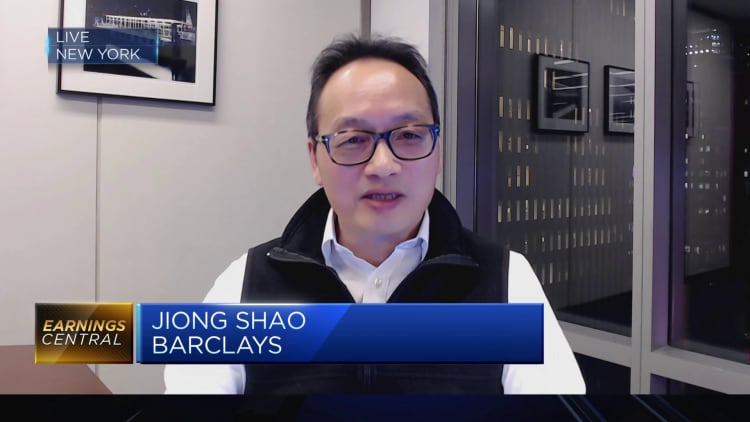

The logo of the Alibaba office building is seen in the Huangpu District in Shanghai, June 16, 2023.
Costfoto | Nurphoto | Getty Images
Chinese tech giant Alibaba Group is betting on its overseas businesses while domestic consumption growth remains sluggish.
One bright spot in Alibaba’s latest earnings report was its international e-commerce business unit, which posted revenue of 28.5 billion Chinese yuan ($4 billion) in the December quarter, up 44% from a year ago. Alibaba International Digital Commerce Group includes platforms like AliExpress, Lazada, Daraz and Trendyol.
“The strong performance was driven by solid growth across all of AIDC’s retail platforms, especially from the crossborder AliExpress Choice business,” the company said.
Meanwhile, revenue from the company’s core e-commerce businesses Taobao and Tmall Group was $18.1 billion, growing only 2% year-over-year.
“We will step up investment to improve users’ core experiences to drive growth in Taobao and Tmall Group and strengthen market leadership in the coming year. We will also focus our resources on developing public cloud products and sustaining the strong growth momentum in international commerce business,” Eddie Wu, CEO of Alibaba Group, said earlier this month.
The tightening of the ship is likely designed to consolidate growth trajectories, de-risk uncertainties of operating in multiple, competitive markets …
Yinglan Tan
founding managing partner, Insignia Ventures Partners
Despite AIDC’s strong sales growth, losses also surged year-over-year mostly from “increased investment in businesses, including AliExpress’ Choice and Trendyol’s international business, partly offset by improvements in monetization.”
Subsidiary shakeup
The quarterly results follow a series of management shuffles at Alibaba and its subunits. Pakistan e-commerce platform Daraz replaced its CEO Bjarke Mikkelsen on Jan. 24. James Dong, CEO of Southeast Asian e-commerce giant Lazada Group, was named as Daraz’s acting CEO. The company said he would “work on a deeper integration between Daraz and our sister companies.”
In early January, Lazada executed a mass layoff across Southeast Asia, which affected employees of all levels including senior management. The cuts hit all departments including commercial, retail and marketing.
People at Alibaba International familiar with the matter told CNBC that the Lazada layoffs were intended to “streamline decision-making and boost organizational and business efficiency.”
“These latest management shake-ups have their roots in the Alibaba split last year, largely a strategy to navigate the regulatory developments in China which have long put pressure on the tech giant,” said Yinglan Tan, founding managing partner at Insignia Ventures Partners.
“AIDC’s nature as a portfolio of diverse and individually complex businesses ranging from Daraz to Lazada also plays a key factor. The tightening of the ship is likely designed to consolidate growth trajectories, de-risk uncertainties of operating in multiple, competitive markets …,” said Tan.
Leadership changes
In March, Alibaba had said it would split itself into six business units and pave the way for individual stock listings. Zhang told investors the move would allow Alibaba’s business “to become more agile, enhance their business decision-making, and respond faster to market changes.”
“Keeping their organisations agile and adaptable is always at the top of the agenda of Chinese tech leaders. This has been made even more urgent with the rise of competitors and changes in the external environment,” said Momentum Works in a January report titled “Understanding Alibaba’s most radical changes in history.”
Mirroring its parent company’s moves, Lazada’s leadership team has also seen its fair share of changes in recent years.
Dong took over as Lazada Group CEO from Chun Li in June 2022, after running the company’s Thailand and Vietnam operations. Prior to that, Dong was head of globalization strategy and corporate development at Alibaba Group and a one-time business assistant to former CEO Zhang.
In 2020, Li took over the role from Pierre Poignant, who succeeded Lucy Peng in December 2018, who was just nine months into the job.
Intense competition
The e-commerce business that once propelled Alibaba to success has run into challenges with upstart competitors such as PDD, while consumption growth in China remains sluggish.
China-based PDD Holdings reported third-quarter revenue nearly doubled, far outpacing Alibaba‘s 9% growth during the same period. PDD said revenue in the quarter was $9.44 billion, up 94% from $4.99 billion in the same quarter of 2022. Alibaba posted 9% year-on-year revenue growth in the third quarter to about $31 billion.
Alibaba’s Hong Kong-listed shares have plunged from an all-time high of 309.4 Hong Kong dollars ($39.59) on Oct. 28, 2020, according to LSEG data. Shares closed at HK$71.50 on Monday.




